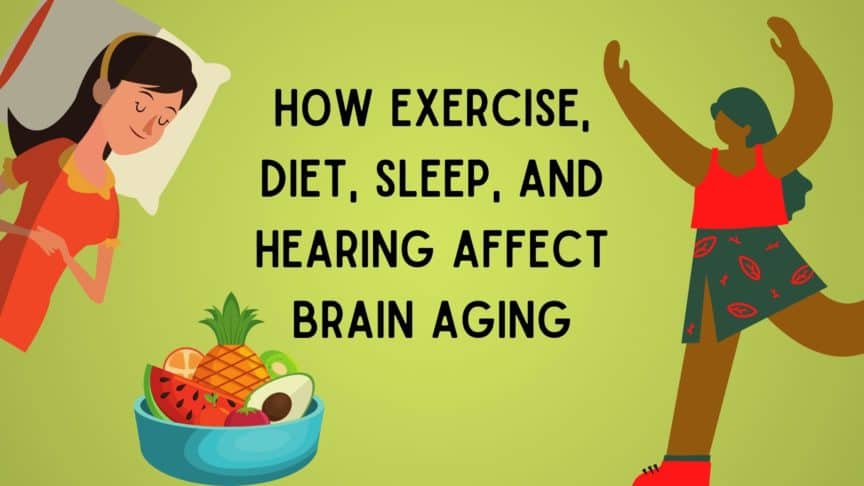Brain health is critical for the various functions that allow us to live and navigate life independently. Cognitive abilities including remembering, decision making, completing tasks, organizing etc. are essential to daily living. As people age there is a range of changes- physical and cognitive – that occur naturally. These changes can be accelerated by various medical conditions, unhealthy behaviors, and genetic predispositions. But there are also ways we can contribute to the health and wellness of our brain including through exercise, diet, sleep, and tending to hearing health.
Exercise & Diet
Consistent physical activity is a great way to keep the body and brain energized. This is a useful way to prevent the development of various medical conditions (hypertension, cardiovascular disease, obesity, etc.) that impact brain health. In addition to exercise, following a nutritionally rich diet has countless benefits. Eating a well-balanced diet that provides healthy minerals and vitamins helps sustain the body, supports blood flow, and a robust immune system. This better allows the body to prevent and recover from illness.
Research has shown that a healthy diet supports hearing health and subsequently brain health! This includes a 2019 study conducted by researchers at Brigham and Women’s Hospital in Boston, MA. Published in the American Journal of Epidemiology, the study involved 3,135 participants who had their hearing tested and dietary information (spanning 20 years) collected. Researchers found that people who practiced healthier ways of eating were:
- 30% less likely to develop mid-frequency hearing loss
- 25% less likely to develop high-frequency hearing loss
The dietary patterns that these participants followed emphasized plant-based foods (vegetables, fruits, legumes, whole grains etc.), reduced intake of dairy, and very little to no processed foods. These practices provide the range of nutrients and minerals that keep the body healthy and well-nourished. By reducing the risk of developing hearing loss, people also reduce their risk of cognitive decline. Hearing loss and cognitive decline are significantly correlated conditions. There are specific areas of the brain that are responsible for processing speech and sound. So eating a well-balanced diet not only is beneficial for hearing health but also brain function.
Sleep
Sleep is such an important process that the body needs. This vital process provides the body with the time to rest and replenish its systems. Adults generally need 7 to 9 hours of sleep every night but millions of people are not actually receiving this amount. According to the American Sleep Association:
- 50-70 million adults in the U.S. have a sleep disorder
- 37% of people between the ages of 20-39 report short sleep duration
- 40% for adults ages 40-59
In addition to the typical symptoms we associate with lack of sleep: grogginess, fatigue, irritability, lack of concentration, etc.; consistent lack of sleep can lead to (or be the result of) sleep disorders. The most common sleep disorders that people experience are insomnia and sleep apnea. These disorders are often related to other conditions like chronic stress, hearing loss, and hypertension which impact blood flow, can produce inflammation, and other symptoms. This not only impacts physical health but also brain health.
Hearing
Hearing loss is the third most common chronic medical condition that people experience today. There are various factors that can cause hearing loss including existing medical conditions, exposure to loud noise, genetic history, aging, and head injuries. Impaired hearing reduces a person’s ability to absorb and process sound which produces numerous symptoms that strain communication. Extensive research has shown that untreated hearing loss can accelerate cognitive decline, specifically contributing to dementia.
In a major 2019 Study, researchers at Brigham and Women’s Hospital and Harvard Medical School, investigated the relationship between dementia and hearing loss. The study involved assessing data from an 8-year health study that included 10,000 participants, ages 62 and older. They found that cognitive decline was:
- 30% higher among people with mild hearing loss
- 42% higher among people with moderate hearing loss
- 54% higher among people with severe hearing loss
The statistics show that people with hearing loss were more likely to experience cognitive decline. Researchers suggest that this significant correlation could be due to cognitive overload caused by the inactivity of areas of the brain that are responsible for processing sound.
This highlights that by exercising, eating well, receiving adequate sleep, and taking care of your hearing health you can contribute to your brain aging healthily. If you are concerned about your hearing abilities, it is important to take an annual hearing test. Contact us today to learn more!

